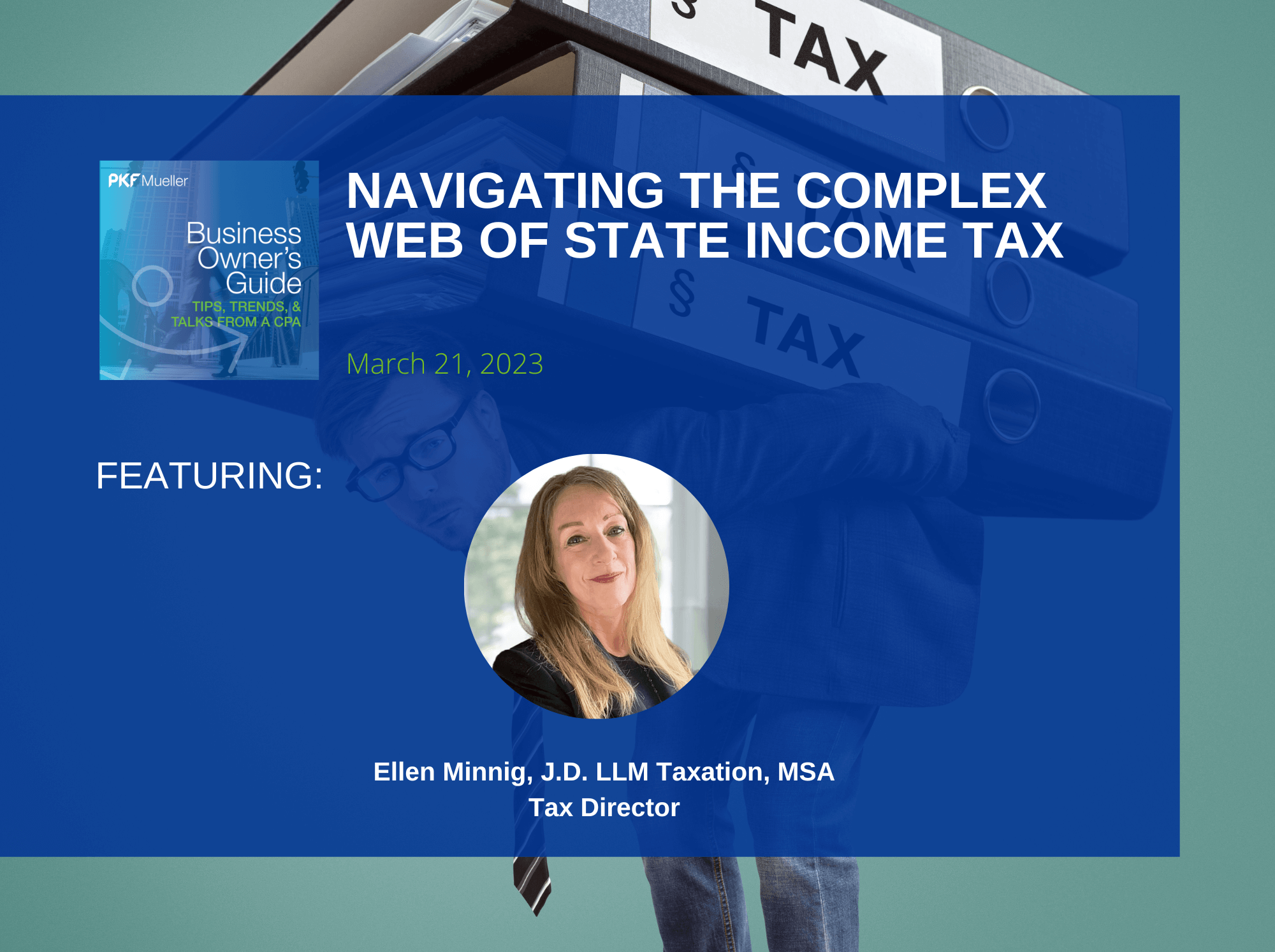Join PKF Mueller CEO David J. Nissen, CPA/ABV, CVA, and guest speaker, Naomi Kaduwela, Head of Kavi Labs (Kavi Global), as they discuss the recent partnership announcement between PKF Mueller and Kavi Global, and what the future of knowledge work looks like.
In this podcast episode, you will be introduced to Digital Knowledge Workers (DKWs) and how you can use them to augment your teams.
LISTEN NOW:
For more information, please contact:

David J. Nissen, CPA/ABV, CVA
CEO
dnissen@pkfmueller.com
+1 630 524 5274

Naomi Kaduwela
Head of Kavi Labs
naomi.kaduwela@kaviglobal.com
+1 312 438 7687
EPSIODE TRANSCRIPT:
[00:00:00] Emily: Hi, I’m Emily and you are listening to the Partner Series, a PKF Mueller podcast. Today we’re going to talk about the future of knowledge work and how you can augment your teams with Digital Knowledge Workers from the help of Kavi Global.
[00:00:18] Emily: PKF Mueller strategically partners with companies like Kavi Global in order to support our mission of enhancing the lifetime success of our clients through innovative financial, accounting, and business management services across a wide variety of industries.
[00:00:33] Emily: Stay tuned to learn the secrets of how to digitize your complex labor intensive business processes and transform your businesses to grow both your top and bottom lines.
[00:00:42] Emily: But before we begin, let’s get to know our guests.
[00:00:45] Emily: Naomi Kaduwela is the head of Kavi Labs. Kavi Labs is the innovation arm of Kavi Global. Naomi is an extremely passionate data scientist. She has earned an MS degree in data science from Northwestern University in Chicago and BS degrees in computer science and psychology from Ithaca College. She is a published author on AI ethics and has over a decade of experience in the field. She is an expert in both human psychology and AI. A graduate of GE’s Digital Technology Leadership Program, Naomi worked at GE Healthcare as a Product Manager in their global data analytics and AI group prior to joining Kavi Global about three years ago.
[00:01:30] Emily: Naomi, thank you so much for joining us today.
[00:01:34] Naomi: My pleasure. I appreciate the introduction, Emily. I’m delighted to be here!
[00:01:39] Emily: Absolutely. Can you give us a quick overview of Kavi Global?
[00:01:42] Naomi: Absolutely. We are a solutions software and services firm, and our mission is to make the world a better place leveraging data analytics and AI.
[00:01:55] Naomi: We help our clients go through their digital transformation, helping them unleash the value trapped in their data and help them actualize their business goals using emerging technologies in a cost effective, scalable, and sustainable way.
[00:02:13] Naomi: Our firm was founded in 2008, and our origins go back to GE, General Electric. We’ve been recognized by Gartner, who you may know as one of the leading technology analysts firm, for the past five years running in data analytics and AI.
[00:02:31] Naomi: We have a broad range of clients from Fortune 500 companies to startups, and they range across industries such as transportation, healthcare, insurance, pharma, manufacturing, banking, and financial services, and so many more.
[00:02:49] Naomi: We currently have rapidly growing operations in U.S. and India.
[00:02:54] Emily: Perfect. Thanks so much for that introduction, Naomi. Also joining us today is PKF Mueller, CEO David J. Nissen. PKF Mueller recently announced a strategic partnership with Kavi Global. So Dave, what can you tell us about this partnership?
[00:03:10] David: Yeah, you know, I really wanted to, to bring that up as Naomi just mentioned about what Kavi Global does. We, we really have a lot of needs of our clients.
[00:03:19] David: So, what we decided to do, is partner with Kavi Global, as one of our strategic partners that we’ve included in, into our suite of services because data analytics, artificial intelligence, and all these other areas are so important to the, in the world we’re in today. So, this is why I think it’s really important to be able to offer these types of services to our growing client base.
[00:03:44] David: I think it’s really a win-win situation.
[00:03:46] Naomi: Definitely, Dave. PKF Mueller and Kavi Global coming together is a very strategic partnership and really helps both our firms bring more value to our clients. As you mentioned, PKF Mueller now has the ability to offer data analytics and AI to their clients, whereas we also have the opportunity to offer expert financial services on our menu of offerings.
[00:04:10] Naomi: So, together we’ve really broadened our capabilities and can co-create more value for our clients together.
[00:04:17] Emily: Which is really exciting. Let’s switch gears a little bit, and talk more about today’s topic. What does the future of knowledge work look like?
[00:04:26] Naomi: Well, today’s business environments are increasingly fast moving and complex.
[00:04:34] Naomi: More than ever, companies need to be able to be nimble, agile, and able to innovate, pivot, and scale quickly. There’s no doubt in anyone’s mind that the future is digital, and our vehicle for enabling that business transformation is the Digital Knowledge Worker, an embodiment of knowledge workers or office workers like us accountants and engineers who work with our minds. The embodiment of this knowledge worker in an AI enabled intelligence software.
[00:05:09] Naomi: So, our vision of the future is… knowledge work is a broad collaboration between humans and the Digital Knowledge Workers, and we’re beginning to see more and more of these Digital Knowledge Workers already becoming integrated into our workforce and working side by side with us to deliver better outcome.
[00:05:32] Naomi: This is great because in the future it means we can do more of what we are better at, like the strategic, innovative, and more imaginative and creative work that’s actually more meaningful and rewarding for us, and we can delegate the more tedious, repetitive, and mentally taxing work to the computers.
[00:05:54] Naomi: Let them go ahead and crunch large volumes of data to identify those predictive trends and patterns that aren’t so obvious to our human eyes. AI can definitely recommend a more optimal, less subjective, less biased decision because it’s immune to some of the human error caused by fatigue. So, we can integrate them to accelerate and improve our business outcomes.
[00:06:20] Emily: So how do you make software intelligent?
[00:06:23] Naomi: We embed some of the latest cutting edge technologies, such as predictive analytics or AI. Things like reinforcement learning or the ability for the software to continuously adapt and learn over time from the feedback data, which is creating a virtuous cycle of continuously improving that process.
[00:06:48] Naomi: Let’s look at an example with one of our transportation clients who wanted to optimally schedule their fleet of hundreds of thousands of assets for repair. We built a Digital Knowledge Worker called the Digital Repair Scheduler, who can find the facility that has the capability and availability to best do that repair while minimizing the out of service repair and transportation costs.
[00:07:20] Naomi: This Digital Knowledge Worker is powered by natural language processing, forecasting, and has a real time optimization. So, this can significantly improve this scheduling process.
[00:07:32] David: Yeah. You know, I, I wanna add some to that, Naomi, because what you’re really saying is you’re taking all your tools, all these artificial intelligent tools and being able to get more production and output from the same costs that you have during a given year. Is that correct?
[00:07:52] Naomi: Exactly, Dave, a big productivity increase.
[00:07:55] Emily: So, should human knowledge workers fear or feel threatened by Digital Knowledge Workers?
[00:08:03] Naomi: I would say it’s just the opposite, Emily. We should welcome them with open arms.
[00:08:09] Naomi: Digital Knowledge Workers are assisting us to do our work faster and more accurately. Adding more and more automation and taking their recommendations will actually allow us to focus on the more innovative and creative value added in strategic parts of our work. We can also take the opportunity to focus on work life balance, offloading some of these tedious and repetitive parts of our work to Digital Knowledge Workers.
[00:08:37] Naomi: We can prevent burnout and take that vacation. So, I would say this new collaboration is definitely something we should embrace as it makes our work more meaningful and is really rewarding to us. Our role in this joint workforce is transitioning to human-in-the-loop, or human-on-the-loop.
[00:08:57] Emily: And what are those terms human in the loop and human on the loop mean, and what’s the biggest difference?
[00:09:04] David: You know, I’ve, I want Naomi to really answer that question, but I think when I first heard that from you, Naomi, that was eye opening. And it was eye opening because 30 years ago we were doing a lot of business consulting and one of the terms that we heard all the time was you have to work on the business, not in the business. Okay?
[00:09:25] David: And too, too often, businesses and business owners, us accountants even, were working too much in the business and you don’t, you have to step back and you have to work on the business.
[00:09:36] David: So I, when I heard you say that, I thought that was the most important thing, an eye opening thing I heard, because I see a lot of similarities between working in the business or working on the business and now what you say is human in the loop or on the loop.
[00:09:50] David: So let’s, why don’t you get into those details, because I think that’s really insightful for the listeners today.
[00:09:56] Naomi: Great analogy, Dave.
[00:09:58] Naomi: So, technically human-in-the-loop is when we have complete control over accepting or rejecting the decisions that are being made by this Digital Knowledge Worker. So, the technology is helping us making a recommendation, and we’re in that decision making loop, approving and rejecting each of these recommendations. Still faster than if we had to do all the analysis and come to that idea ourselves, however, we can definitely gain that productivity boost by taking their help.
[00:10:31] Naomi: The next evolution is human-on-the-loop, and this is when Digital Knowledge Workers begin to operate more autonomously to make decisions. The human in the loop is moved out of that decision making loop and more into an oversight role as Dave calls, focusing on the business.
[00:10:51] Naomi: Where just as self-driving cars become a reality, they’re introduced with human oversight to make sure that that new paradigm is safer and the adoption occurs. So, as we’re overseeing these technology solutions through a human on the loop model, we can actually monitor the important KPIs or key performance indicators to the business and focus on improving those end outcomes.
[00:11:19] Naomi: So, in many cases we start with human in the loop mode, and as these Digital Knowledge Workers are refined through feedback and we gain trust in them and they mature, they mature into these human on the loop models. In many cases we’re not quite there yet to full automation.
[00:11:39] Emily: Really interesting, Naomi. Now, what are some other examples of human collaboration with digital knowledge workers and how they together create more value for businesses and their customers?
[00:11:51] Naomi: Great question, Emily. I’d like to give you one example from the healthcare provider space that’s quite impactful.
[00:11:59] Naomi: Neonatal nurses came to us with a problem. There’s no way to continuously monitor infants post-surgery for pain. Nurses cannot continue to attend to each baby 24/7. Thus, these babies are at risk of over under treatment for pain. And this is really a big deal because over under treatment of pain can actually lead to these long-term neurodevelopmental consequences, like structural and functional changes in the brain.
[00:12:36] Naomi: So we built a Digital Knowledge Worker. A digital NICU nurse to actually aid the nurses by monitoring the infants 24/7. So, this Digital Knowledge Worker is deployed at one of the premier children’s hospitals in Chicago, and it uses some of the cutting edge computer vision algorithms, trained on this brain based validated facial coating system, which basically means it takes the expressions on these babies from this video stream and automatically detects pain and alerts the nurses when they need to take action.
[00:13:12] Naomi: So, this is a really powerful solution that has a lifelong positive impact to the patient, their family, and even the practitioner.
[00:13:20] David: Yeah. You know, it’s, it’s interesting you bring that up as an example, cause I just had my eighth grandchild and she was born five weeks premature. And she’s in the, what’d you call it?
[00:13:33] David: The, NICU, NICU unit, and I and they’re very good, good nurses, great nurses, but there’s not enough of ’em. And these kids are all there, innocent, not obviously able to talk or communicate. And I could see how that could be really, really helpful. And I can see that in as it touches my life. I could see how important something that could be in our day-to-day lives.
[00:13:56] Naomi: Absolutely, Dave.
[00:13:58] Emily: So if I’m a CEO or CFO of a company, how do I know that I need a Digital Knowledge Worker to augment my team?
[00:14:07] Naomi: Well, here’s a quick checklist you can use to identify opportunities. To introduce a Digital Knowledge Worker into your workplace. First, if you see complex business processes that have a large number of manual touch points that are very time consuming and labor intensive, that’s a great opportunity.
[00:14:27] Naomi: You might also find high volume or frequency of transactions that are simply too difficult for humans to keep up with. Also, a great opportunity.
[00:14:39] Naomi: Third, where you need analysis of large data sets and perhaps requiring some complex calculations, forecasts, predictions, optimizations, things of that nature to really make an optimal decision. Definitely a great place to take the help of a Digital Knowledge Worker.
[00:14:57] Naomi: Also, where we see mistakes are costly, right? And we may be making them, due to human fatigue or being overloaded. If you look back at one of our, our previous cases of a high volume or frequency of transactions. So, anywhere where mistakes are costly, we can automate, improve the, the reliability of that and reduce the amount of mistakes by increasing that accuracy.
[00:15:25] Naomi: And finally, anywhere we see quality issues associated with potential biases or errors in that human decision making. You know, some of these biases can be unconscious bias. We don’t do it on purpose, but they occur and they impact our processes.
[00:15:43] Naomi: So, in any of these, if any of these situations sound familiar to you, feel free to give us a call and we would love to chat with you about designing a Digital Knowledge Worker just for you!
[00:15:54] David: You know, I just want to add one thing. Those are, that’s a great checklist. I think it’s fantastic. And I think if I look at, at this as, in a financial standpoint, what you’ve said before too, if you need to add more people to solve a problem, look at that, because what is the biggest issue we have in the United States and the world right now?
[00:16:15] David: Labor. We can’t find labor. So what you’re saying is anytime there’s, like you said, large number of manual touch points, or if you have to have more people to solve a problem, perfect opportunity for the Digital Knowledge Worker.
[00:16:30] Naomi: Absolutely, Dave.
[00:16:31] Emily: Really great information, Naomi. And Dave, thank you for sharing PKF Mueller’s side.
[00:16:37] Emily: Now, if any of our listeners have any questions or would like to find out more information about digital knowledge workers, would you please share your contact information, Naomi,
[00:16:46] Naomi: My pleasure, Emily. Please feel free to reach out to me at noami.kaduwela@kaviglobal.com. That’s N A O M I . K A D U W E L A @ K A V I G L O B A L.com, or give me a call at (312) 438-7687. Thank you, Emily, and Dave, and the entire PKF Mueller team for inviting me to your podcast.
[00:17:21] Emily: And thank you for listening. Don’t forget to visit us at pkfmueller.com to learn more about our firm services. And to learn more about Kavi Global, visit kaviglobal.com. That’s K A V I global.com. You can also follow PKF Mueller on social media for more updates, insights, and upcoming events.



